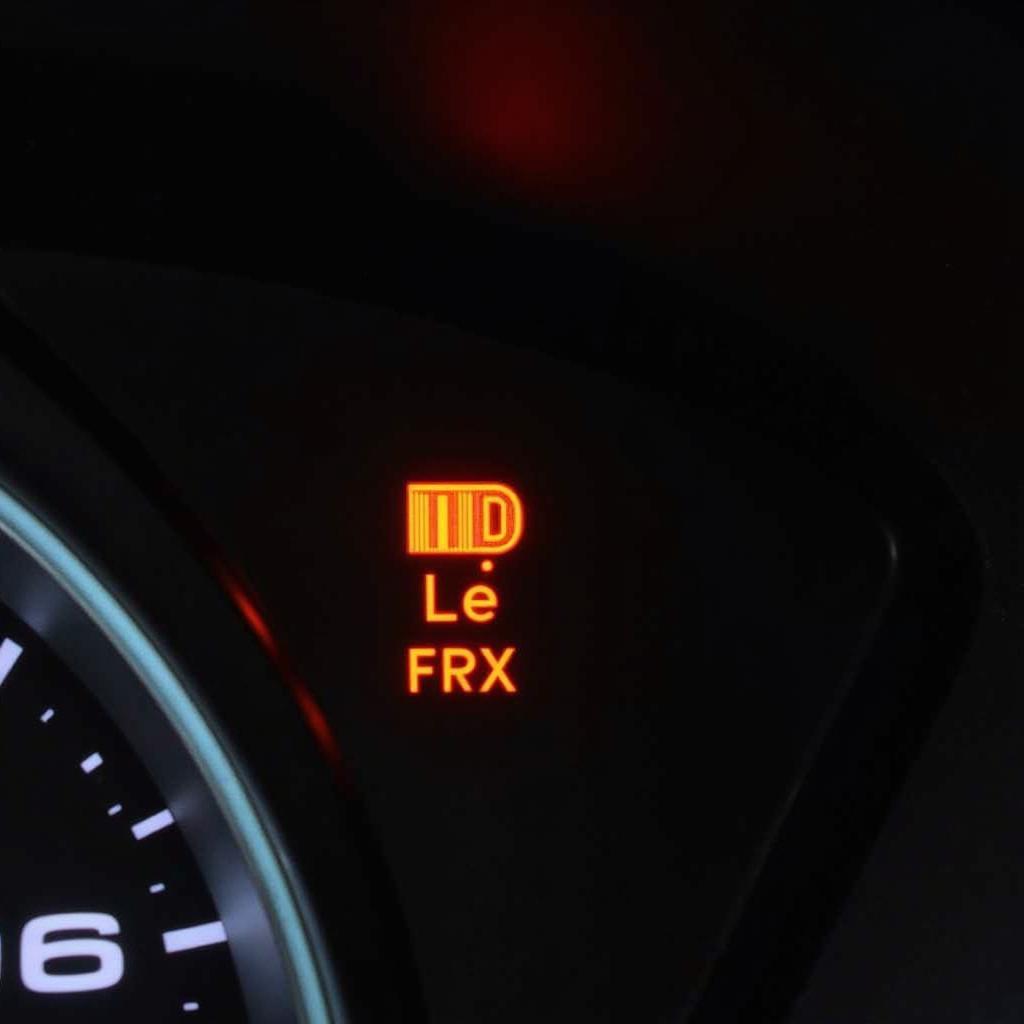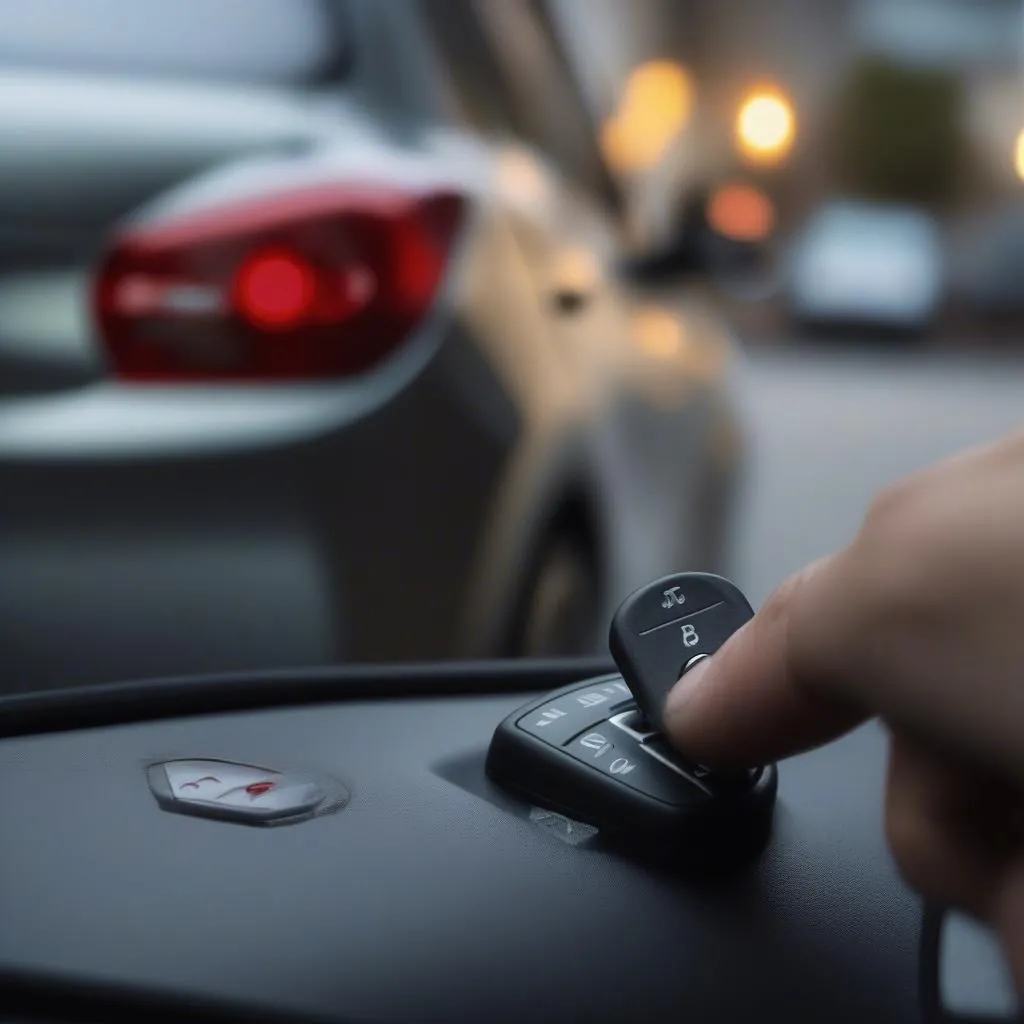The 2012 Hyundai Sonata brake warning light can be a real headache. It’s a signal that something isn’t right with your braking system and needs attention. This article aims to provide a comprehensive guide to understanding, diagnosing, and resolving issues related to the 2012 Hyundai Sonata brake warning light. We’ll cover common causes, troubleshooting steps, and potential solutions, empowering you to address this issue effectively.
 2012 Hyundai Sonata brake warning light illuminated on the dashboard
2012 Hyundai Sonata brake warning light illuminated on the dashboard
One of the most common reasons for the brake warning light is low brake fluid. Your brake system relies on hydraulic pressure to function, and low fluid levels can significantly compromise its effectiveness. This can occur due to leaks in the brake lines, worn brake pads, or a faulty master cylinder. Checking your brake fluid level is a simple yet crucial first step.
Understanding Your Brake System
The braking system in your 2012 Hyundai Sonata is a complex network of components working together to ensure your safety. Understanding how these parts interact is key to diagnosing the root cause of the warning light. The system includes the master cylinder, brake lines, calipers, rotors, drums, and brake pads. Each component plays a vital role, and a malfunction in any one can trigger the warning light.
Common Causes of the 2012 Hyundai Sonata Brake Warning Light
There are several reasons why your 2012 Hyundai Sonata brake warning light might illuminate. Some of the most common causes include:
- Low Brake Fluid: As mentioned earlier, this is a frequent culprit and can indicate a leak or worn brake pads. See our article on brake warning light car for more details.
- Worn Brake Pads: Thin brake pads can also trigger the warning light, as they reduce the pressure in the brake system.
- Faulty Brake Sensor: The brake sensor monitors the thickness of your brake pads and alerts you when they need replacement. A malfunctioning sensor can give a false warning.
- ABS Issues: Problems with the Anti-lock Braking System (ABS) can also illuminate the brake warning light. This could be due to a faulty sensor or a problem with the ABS module.
- Parking Brake Engaged: While seemingly obvious, sometimes the parking brake can be partially engaged, triggering the light.
Troubleshooting the Brake Warning Light
Here’s a step-by-step guide to help you diagnose the problem:
- Check the Parking Brake: Ensure the parking brake is fully released.
- Inspect Brake Fluid Level: Open the hood and locate the brake fluid reservoir. Check the fluid level against the minimum and maximum markers. If it’s low, top it off and monitor for further leaks.
- Visually Inspect Brake Pads: Check the thickness of your brake pads through the wheel spokes. If they appear thin, they likely need replacement. You can find more information about this issue on our page about sonata 2012 brake warning.
- Check for Leaks: Inspect the brake lines and calipers for any signs of fluid leaks. Leaks can appear as wet spots or drips.
When to Seek Professional Help
While some issues can be addressed with basic troubleshooting, others require professional expertise. If you’re unsure about any aspect of the diagnosis or repair, it’s always best to consult a qualified mechanic. This is particularly true for issues relating to the ABS system, which can be complex to diagnose and repair.
“Ignoring a brake warning light is like playing Russian roulette with your safety,” says John Smith, a certified automotive technician with over 20 years of experience. “Brakes are essential for safe driving, and any issues should be addressed promptly.”
Prevention is Key
Regular maintenance is crucial for preventing brake problems. This includes regular brake inspections, timely brake pad replacements, and routine brake fluid flushes.
“Preventative maintenance can save you a lot of headaches and money in the long run,” adds Maria Garcia, another experienced automotive technician. “Regular checks can help identify potential problems before they become major issues, ensuring your safety and the longevity of your vehicle’s braking system.” A failing car battery can sometimes create electrical issues that can affect the brake warning light. For more information, see our article on car battery draining while idle. You may find a connection there with some electrical issues you’re having. If you are looking for information on connecting your phone to your car radio via Bluetooth, you can check out our article on sony car radio bluetooth how to connect.
Conclusion
The 2012 Hyundai Sonata brake warning light should never be ignored. By understanding its potential causes and following the troubleshooting steps outlined in this article, you can take proactive steps to ensure your safety and the proper functioning of your vehicle. Remember, a properly functioning braking system is essential for safe driving.
FAQ
- What does the 2012 Hyundai Sonata brake warning light mean? The brake warning light indicates a potential issue with your braking system, ranging from low brake fluid to worn brake pads or a faulty ABS system.
- Can I drive with the brake warning light on? While you might be able to drive short distances, it’s highly recommended to address the issue immediately, as continuing to drive could compromise your safety.
- How do I check my brake fluid level? Locate the brake fluid reservoir under the hood and check the fluid level against the minimum and maximum markers.
- How often should I replace my brake pads? Brake pad replacement intervals vary depending on driving conditions and habits, but it’s generally recommended to have them inspected every 12,000 miles.
- What should I do if I suspect an ABS problem? Consult a qualified mechanic immediately, as diagnosing and repairing ABS issues requires specialized knowledge and equipment.
- How can I prevent brake problems in the future? Regular maintenance, including brake inspections, fluid flushes, and timely pad replacements, is key to preventing brake issues.
- Is it expensive to fix brake problems? The cost of repair varies depending on the specific issue, ranging from a simple fluid top-off to more complex repairs involving the ABS system.

